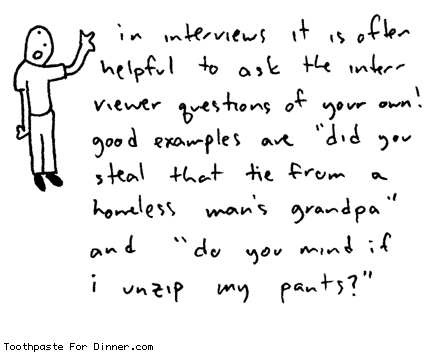How much do you know about your industry?
Another great 'Corner Office' column from the New York Times this past weekend, this one an interview with Jim Whitehurst, president and chief executive of Red Hat, the provider of Linux and other open-source technologies. As is typical in the Corner Office series of CEO and executive interviews, writer Adam Bryant asked Whitehurst about recruiting. Have a look at Whitehurt's take on what questions he likes to ask prospective candidates -
Bryant - Let’s shift to hiring. What questions do you ask? How would you interview me, for example, if I were in your office?
Whitehurst - I would be all over you about understanding the economics of the newspaper business — where it’s been, where it’s going, what do you see as the future of it? How is The New York Times positioned? Because I want to know if you have enough innate curiosity, and analytical and conceptual skills, to be able to frame strategically where you stand. And a lot of it is about discovering if you are curious enough to care and want to know. Because I don’t want somebody working for me who doesn’t care, right? To me, it also signals that the person isn’t in it just for himself or herself. Are they really going to be a team player?
If you’re really trying to understand the whole business and you’ve thought about it and you clearly have opinions around it, that says you’re not spending 100 percent of your time just making sure you nail your own job. It means you’ve clearly had to build relationships and talk to other people within the company. So I think that’s a real telltale sign.
Steve comment - I really like this take, as the answer to this kind of question can be really telling and indicate how engaged and interested the candidate is about what he or she does, and the larger economic and competitive environment in their industry. It pushes the candidate off of 'Let me tell you more about me', which is what most of us who sit in interviews are prepared to discuss.
More from the Times piece, as in the follow-up question Whitehurst pokes holes in traditional and behavioral interviewing approaches -
Bryant - It’s an interesting bank shot to get insights about someone.
Whitehurst - It is indirect. Here’s what I find: If you ask the traditional questions — things like “Tell me about a situation where you failed” or “Tell me about a situation where you were particularly collaborative” — most people have answers that really come off as scripted.
Steve comment - Again, asking questions that the candidate already knows are coming, (most of the 'Tell me about a time..' ones), can sometimes slip into well-rehearsed, coached, and crafted responses that don't do all that much to help gain insight and even more importantly, to draw distinctions across candidates. I am not saying these kinds of questions should not be used at all, but rather that since in a way they are telegraphed, that digging into some more broad conversations about bigger and larger issues can be more telling and instructive as you compare the various candidate responses.
Now I imagine the kinds of positions and candidates that a CEO like Whitehurst is personally interviewing are for more senior or executive roles, and these more big picture and strategic type questions seem more appropriate. But I think they could make sense at deeper levels of the organization as well, particularly in an age where the next great big idea might come from anywhere in the organization.
What do you think, do you ever ask candidates about the economics and the strategies of your industry?

 Steve
Steve
Reader Comments